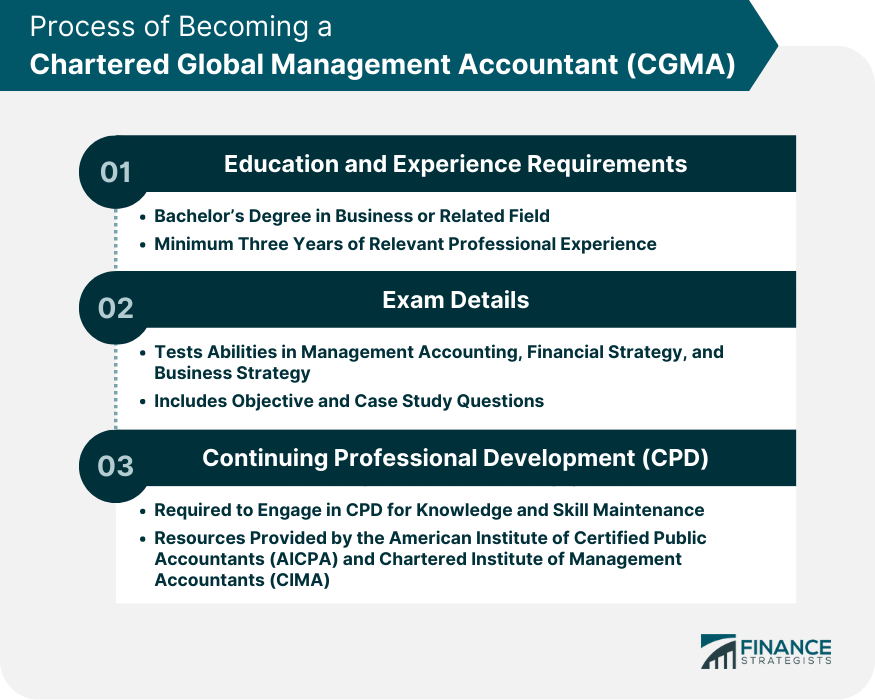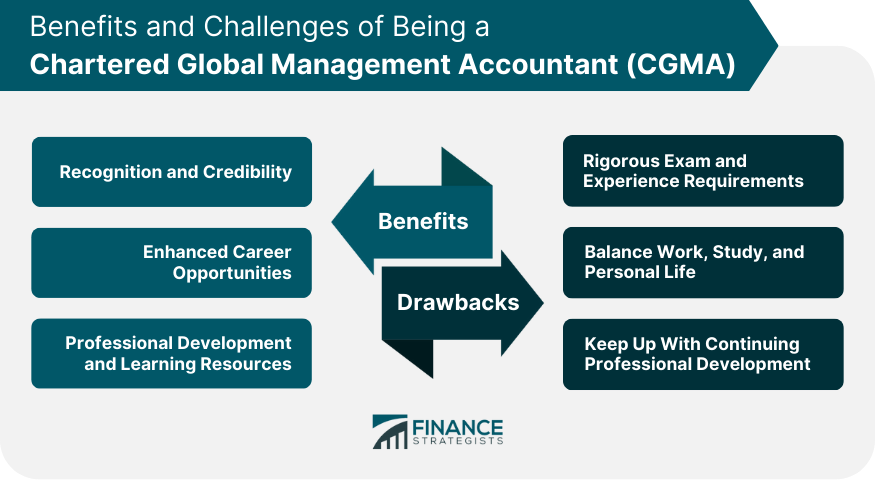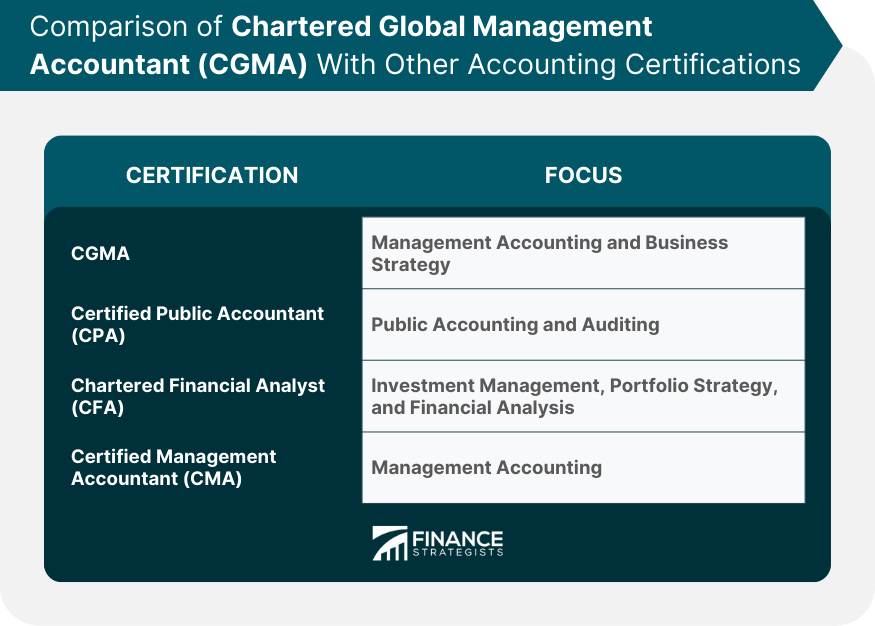A Chartered Global Management Accountant (CGMA) is a globally recognized professional designation for management accountants and financial managers. The designation is awarded by the American Institute of Certified Public Accountants (AICPA) and the Chartered Institute of Management Accountants (CIMA). The CGMA signifies proficiency in finance, operations, strategy, and management, providing a broad-based business perspective. The CGMA is designed to develop and recognize professionals who can connect all aspects of business, from financial performance to strategic management. This designation emphasizes the holistic role of management accountants, moving beyond the traditional confines of finance into a wider business context. To become a CGMA, one must first meet certain educational and professional experience prerequisites. Candidates must pass a comprehensive exam, demonstrating proficiency in the key competencies defined by the CGMA Competency Framework. A CGMA contributes to an organization by applying its understanding of business strategy and performance management. They drive better decision-making through strategy formulation, planning, risk management, and financial analysis. A CGMA is expected to possess a range of skills, including financial management, business strategy, risk management, and decision-making. Moreover, proficiency in financial reporting, strategic planning, performance evaluation, and business ethics is highly desirable. Candidates should hold a bachelor's degree or equivalent, preferably in business or a related field. Also, a minimum of three years of relevant professional experience in business or finance is needed. The CGMA exam tests candidates' abilities in areas like management accounting, financial strategy, and business strategy. The exam format includes both objective and case study questions. Once the CGMA designation is achieved, professionals are required to engage in CPD to keep their knowledge and skills up-to-date. The AICPA and CIMA provide resources and opportunities for learning and development. Holding a CGMA title enhances professional credibility and recognition in the global business community. This credential signals advanced skills and commitment to high ethical standards. A CGMA can open doors to various roles within finance, business strategy, and management at global organizations, significantly enhancing career prospects. CGMAs get access to a wealth of learning resources, including webinars, industry reports, and toolkits, providing continuous professional development opportunities. The CGMA exam and experience requirements are challenging, and the road to certification can be time-consuming and demanding. Candidates often struggle with balancing their professional commitments and personal lives with the rigorous study required for the CGMA exam. Staying updated with industry trends and standards, as required by CPD, can be challenging and time-consuming for some professionals. CGMAs often play a vital role in strategic decision-making, using their financial expertise to drive business strategies and outcomes. CGMAs' broad understanding of global business practices allows them to navigate complex business landscapes, facilitating international business operations. While both CGMA and CPA are prestigious accounting designations, they focus on different areas. The CGMA emphasizes management accounting and business strategy, while the CPA focuses more on public accounting and auditing. While the CFA designation is centered on investment management, portfolio strategy, and financial analysis, the CGMA focuses on broader aspects of business and financial management. The CGMA and CMA are similar in their focus on management accounting, but the CGMA provides a more international perspective, reflecting its global acceptance. The Chartered Global Management Accountant is a prestigious, globally recognized designation that signifies a high level of proficiency in management accounting, strategy, operations, and finance. The role of a CGMA is multifaceted, contributing to strategic decision-making and driving improved business outcomes. Despite the rigorous process of acquiring the designation and the commitment required for ongoing professional development, the benefits are numerous. CGMAs not only enjoy enhanced professional credibility but also have access to a broad range of career opportunities and a plethora of learning resources. Their understanding of international financial and business standards positions them uniquely to navigate the complexities of the global business landscape. With evolving industries and the increasing complexity of business challenges, the demand for the strategic acumen and financial expertise of CGMAs is poised to grow in the future.What Is a Chartered Global Management Accountant (CGMA)?
How the CGMA Designation Works
Obtain the Certification
Role of a CGMA in an Organization
Skills Required for a CGMA
Process of Becoming a CGMA
Education and Experience Requirements
Exam Details
Continuing Professional Development (CPD)

Benefits of Being a Chartered Global Management Accountant
Recognition and Credibility
Enhanced Career Opportunities
Professional Development and Learning Resources
Challenges in Becoming a Chartered Global Management Accountant
Rigorous Exam and Experience Requirements
Balance Work, Study, and Personal Life
Keep Up With Continuing Professional Development

Impact of CGMAs in the Business World
Strategic Decision-Making
Realm of Global Business
Comparison With Other Accounting Certifications
CGMA vs Certified Public Accountant (CPA)
CGMA vs Chartered Financial Analyst (CFA)
CGMA vs Certified Management Accountant (CMA)

Conclusion
Chartered Global Management Accountant (CGMA) FAQs
A CGMA is a globally recognized professional designation for management accountants and financial managers, awarded by the American Institute of Certified Public Accountants (AICPA) and the Chartered Institute of Management Accountants (CIMA). The designation signifies proficiency in finance, operations, strategy, and management.
To become a CGMA, you need to meet specific education and professional experience prerequisites and pass a comprehensive exam. The certification requires a bachelor's degree or equivalent and at least three years of relevant professional experience.
The CGMA designation provides enhanced professional credibility and global recognition. It opens up career opportunities in finance, business strategy, and management roles in global organizations. CGMAs also gain access to continuous professional development resources.
Obtaining the CGMA designation is demanding, requiring rigorous exams and fulfilling professional experience prerequisites. Balancing professional, personal, and study commitments can be challenging. Once certified, maintaining the designation requires ongoing professional development to stay updated with industry trends and standards.
While all prestigious, different certifications focus on various aspects of finance and accounting. The CGMA emphasizes management accounting and business strategy, the Certified Public Accountant (CPA) focuses on public accounting and auditing, the Chartered Financial Analyst (CFA) is centered on investment management and financial analysis, and the Certified Management Accountant (CMA) also focuses on management accounting, but with less of an international perspective than the CGMA.
True Tamplin is a published author, public speaker, CEO of UpDigital, and founder of Finance Strategists.
True is a Certified Educator in Personal Finance (CEPF®), author of The Handy Financial Ratios Guide, a member of the Society for Advancing Business Editing and Writing, contributes to his financial education site, Finance Strategists, and has spoken to various financial communities such as the CFA Institute, as well as university students like his Alma mater, Biola University, where he received a bachelor of science in business and data analytics.
To learn more about True, visit his personal website or view his author profiles on Amazon, Nasdaq and Forbes.











